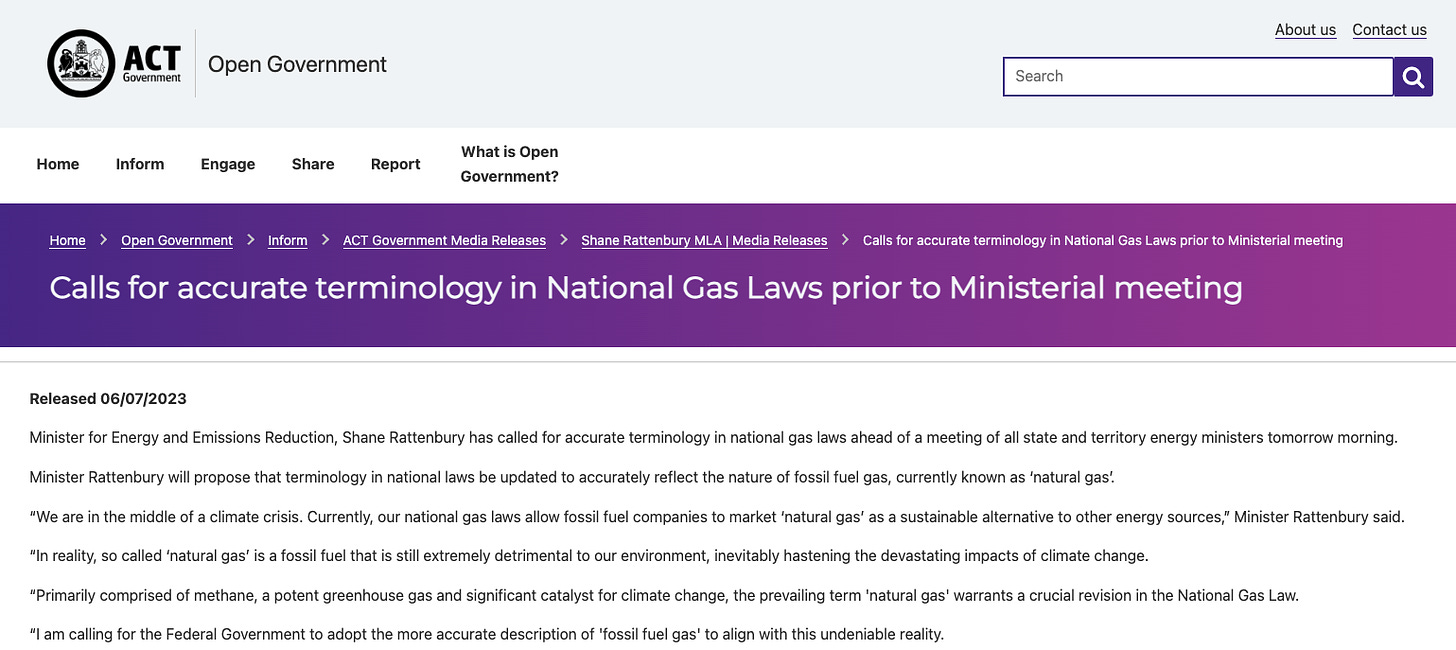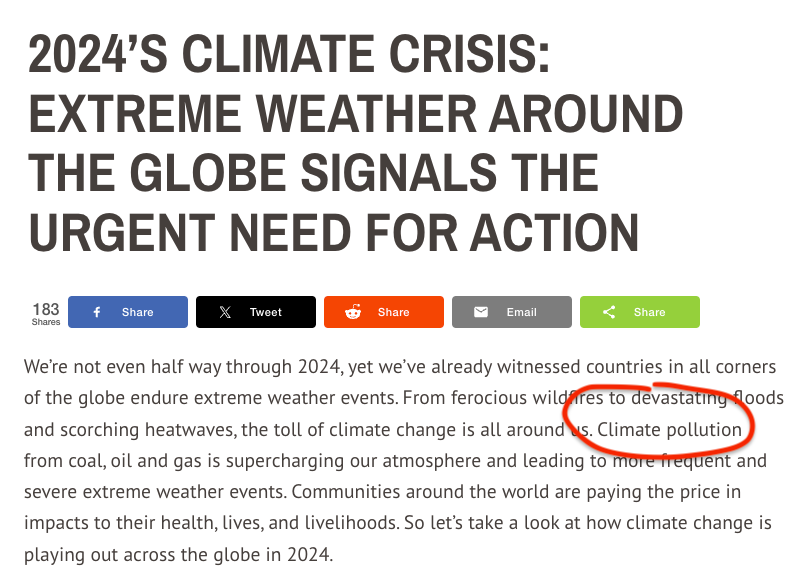Gaslighting gasmongers - and the 'gentle, invisible violence' of purr words and hyponymy
Grammar you shouldn't leave home without
Image by Shena Tschofen used under CC BY-NC-ND 2.0 license.
This post will be a lesson in ‘purr words’ and ‘hyponymy’ - it’s another instalment of my ‘grammar you shouldn’t leave home without’ series.
But first: I know Nero didn’t fiddle while Rome burned - but it’s this hardworking, longstanding meme that comes to mind when our politicians go on approving dirty, polluting, fossil fuel projects. Like the two dirty gas projects recently reported by Greg Jericho in The Guardian, and approved by Labor’s Federal Minister for the Environment Tanya Plibersek on behalf of Australia’s Department of ‘Climate Change, Energy, the Environment and Water’.
Why the scare quotes around the Department’s title? It shows us again the words ‘climate’ and ‘energy’ being put together. I wrote in this recent post about the constant ‘collocation’ of ‘climate’ with ‘energy’. ‘Collocation’ is a term we use in linguistics to talk about words that are routinely put close together. To ‘collocate’ two words is to ‘co-locate’ them. And in this process, we get used to hearing these words together, so that over time, if you just hear one, you’ll assume the other. Like those couples who can never go out without their ‘other half’, who finish each other’s sentences - after a while you stop being able to imagine them as two separate people. By constantly talking about ‘climate’ with ‘energy’, it’s like we can’t talk about the urgent problem of climate without its ‘other half’ constantly showing up and keeping an eye on what’s going on. Like ‘energy’ is exercising coercive control.
These two words seem ordinary on their own, and ordinary when put together. As I wrote in that post, the collocation of ‘climate’ and ‘energy’ seems completely natural. Some of the white men who’ve written about ideology argue - like French sociologist Pierre Bourdieu for instance - that ideologies work by bubbling along under our nose. In Bourdieu’s words:
Symbolic power is that invisible power which can be exercised only with the complicity of those who do not want to know that they are subject to it or even that they themselves exercise it.
This kind of power is a ‘gentle, invisible violence’, Bourdieu argued. This very accurately describes how the phrase ‘climate and energy’ is working on us. Dominant ideologies do their work through our common words and phrases, the ones we utter without a moment’s thought.
Gaslighting, greenwashing gasmongers
The two gas projects mentioned above are attached to the same company. It’s a gas company, which describes itself as ‘a world-class supplier of affordable, reliable and secure natural gas – committed to delivering essential energy for life.’ There’s so much to say about the greenwashing in this short sentence fragment.
First of all, let’s focus on ‘natural gas’. I will leave David Suzuki to explain to you just how un-natural and dangerous gas is. Concerns about the use of the word ‘natural’ to label this heat-trapping fossil fuel have been raised, including by Shane Rattenbury, the ACT’s Water, Energy and Emissions Reduction Minister, who tried to get his counterparts across the country to rename ‘natural gas’ to ‘fossil gas’ in Australia’s national gas law. Rattenbury had read the research - see for instance this report by the Yale Climate Communication team - that shows how ‘natural gas’ makes people feel good, while labels like ‘methane’ or ‘methane gas’ makes them feel concerned. Respondents believed ‘natural gas’ was much less harmful than other fossil fuels, and they associated ‘natural gas’ with themes like ‘clean’ and ‘cooking’ while the term ‘methane gas’ evoked themes of climate change and global warming.
Rattenbury argued in his ministerial press release:
These linguistic nuances extend far beyond mere words, intricately influencing consumer behaviour and exerting profound implications on industry investment determinations.
Ok, that whole ‘mere words’ thing I can’t get behind - words are little packages that move meanings around the nervous system of society. They are never ‘mere’ anything - that is precisely why we have to think about and analyse every single word choice in the climate fight. But I wholeheartedly back his overall point. Rattenbury’s pro-planet, pro-climate proposal was shut down by the rest of Australia’s largely Labor state and federal ministers.
In its marketing, this company not only associates ‘gas’ with all the positive connotations of ‘natural’. The word is loaded up with even more ‘purr words’ - words that attract positive feelings - like ‘affordable’, ‘reliable’ and ‘secure’. The more these words are put together or ‘collocated’, the more their happy meanings will rub off onto ‘gas’. So ‘gas’ will feel good, despite its role in polluting our atmosphere, heating our planet, and destabilizing our climate.
Read this from the Climate Council on what is wrong with gas.
The power of hyponyms
Dressing up dirty words with purr words is a classic greenwashing strategy - I’ve previously quoted Herbert Schmertz who worked for Big Oil, on how you need to ‘to wrap yourself in the good phrases while sticking your opponents with the bad ones.’ Another classic strategy is to recruit what linguistics call ‘hyponymy’. Let’s take a look.
The company busy marketing its dirty gas does not use ‘gas’ in its name. As much as they are working hard to imbue ‘gas’ with good feelings, they know there’s a word that is much easier to work with. So they call themselves an ‘energy’ company. Gas is, of course, a form of energy, which means the word ‘energy’ includes things like ‘gas’. I know this is obvious - but let me school you in the techical relationship between these two words, because once you know it, you will realize how it is another form of ‘gentle, invisible violence’. When we put ‘gas’ and ‘energy’ side-by-side, this relationship is called ‘hyponymy’. This is the relationship between two words, where one is a big general category of things or stuff, while the other word refers to something much more specific from this same category.
So ‘energy’, in the context of power to run homes, transport, agriculture, etc, (rather than say ‘chakras’) includes gas, coal, oil, solar, wind, and hydro. While the word ‘gas’ is tied to dirty fossil fuels, the word ‘energy’ is completely indifferent to the way it is generated. Wel, not completely indifferent, because (as I noted here) we have to specify when we mean energy created by renewable sources, but not when they come from polluting fossil fuels. So if anything, ‘energy’ as the unmarked category has the back of dirty fuel sources.
Hyponymy is a classic political strategy to avoid the negative or problematic meanings that specific words attract. As my colleague and mentor, the very brilliant linguist Professor Ruqaiya Hasan, explains, the use of a ‘superordinate’ category allows your hearers or readers to stand a long way back from what is going on so that the picture you get is a little bit fuzzy:
… with their relatively more general meanings, the superordinate items are a good device for ‘withholding’ information.
Being both a non-white and non-male linguist Ruqaiya Hasan has had her work ignored or (mis)appropriated by many linguists. She was a truly brilliant scholar who cut through the crap. In a classic paper on globalization and ideology, she explained hyponymy using an example from news reports of planned protests when the World Trade Organization meeting was held in Sydney back in 2002:
… let me present a quick example, provided recently by the Australian Chief Superintendent of Police who, prior to a contentious meeting of the globalizers, announced that ‘normal measures for crowd control will be employed’ if the protesting crowd refused to ‘disperse on advice’. The formulation ‘normal mea- sures for crowd control’ does away with such repugnant facts as the use of batons, tear-gas, rubber bullets and arrests, while creating a spurious sense of comfortable normality.
The point is you don’t have to mention ‘batons and tear gas’, when you can say ‘normal measures for crowd control’. Instead of using specific words which come with negative meanings and connotations, you use words which are big and general, and therefore, neutral and comfortable. In this way, you prevent your audience from lingering over the details. You stop them connecting all the dots. So everytime a dirty fossil fuel company says ‘energy’, instead of ‘gas’ or ‘coal’ or ‘oil’, they are leaning into this strategy of controlling access to information.
Why we should say ‘carbon pollution’ instead of saying ‘carbon emissions’
Here’s another classic example of hyponymy in the climate space: carbon ‘emissions’ versus carbon ‘pollution’. There are lots of things that fit into the category of ‘emissions’. Plants emit oxygen into the atmosphere, just like burning fossil fuels emits CO2. So the word ‘emissions’ doesn’t offer a judgement about the content of the emissions, or whether or not the emissions affect the environment. The verb 'to emit' equally describes plants emitting life-giving oxygen, and coal-burning power stations emitting planet-warming CO2.
‘Pollution’, on the other hand, is upfront and specific in its meanings. It describes a process where harmful materials are contaminating and degrading the environment. Check out this recent press release from the Climate Council - they have switched their language over to hold dirty fossil fuels accountable.
This choice has consequences for other words we use when talking about climate. If we are using the term ‘emissions’, rather than pollution, we talk about the ‘big emitters’ rather than the ‘big polluters’. We can talk about ‘low emissions’ technology, rather than ‘low pollution’ technology. ‘Emissions’ makes us feel like time is on our side. ‘Pollution’ carries the necessary sense of urgency about the radical way we need to change our lives.
Greenwashing gas
This isn’t even the end of the greenwashing - or to use a more specific term I’ve recently read, climatewashing - in the small tag line used by the gas company, which was given the ‘greenlight’ to operate up to 151 gas wells by Australia’s Environment Minister. Until 2080. The document issuing this approval needs its own study: for example, there are 22 mentions of ‘climate’ in this document, but 21 of these appear in the document footer which repeats the name of the government Department - and the one other usage doesn’t refer to climate change either. I’m glad to see the 10 times the word ‘koala’ is used in this document - but not one single mention of climate change.
Remember the gas company’s short and powerful summary of its business: ‘a world-class supplier of affordable, reliable and secure natural gas – committed to delivering essential energy for life.’ On top of the very important hyponym ‘energy’, this tag line is packed with purr words. I’ve mentioned the positive power of the adjectives ‘natural’, as well as ‘affordable’, ‘reliable’ and ‘secure’. Let’s add ‘essential’ and ‘world-class’ to this list - what even is a ‘world-class’ gas company??
Check out the verbs, including the words derived from verbs: ‘supplier’ and ‘delivering’ - these words are also positive. This business is selling itself to us as a company that is all about giving and not taking. And then there is the word ‘committed’, a verb that comes with connotations of striving for something better. These dirty fuel guys know what they are doing.
The recent presidential debate only highlights, yet again, that communications are essential to the fight on climate. As the Arielle Samuelson and Emily Atkin over at Heated wrote, in a post they called ‘Night of the Living Dead’:
Climate experts know this well: If you want to beat a bullshit artist, you have to be better than them at communicating. If you’re not good at communicating, that’s OK—but don’t put yourself in a position where you’re debating them in a huge public forum. Because if you do, and you fail, you’ll ultimately harm your cause—and by extension, the planet.
We gotta beat these bullshit artists.









I read your pieces over and over Annabelle. You "practise what you preach", your writing being such a clear example of how best to communicate. I am determined to put into practice what I learn from your posts. I wish that journalists especially, would be more aware of purr words and collocation, then we might have a better idea of the "gentle, invisible violence" of the power of words. I'd never heard of Pierre Bourdieu; I'll be following up some writing by him.
You never fail to astound me, Annabelle. Proving once again the power (insidious power!) of words x